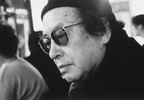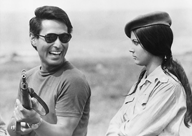Juror
Kuroki Kazuo
 One Place, One Era, —Juror’s Statement
One Place, One Era, —Juror’s Statement
At the beginning of July, a group of elderly men clad in mourning gathered under the hot sun at a temple near the Kaminarimon gate in western Asakusa, Tokyo. Some of the men were members of the Ao No Kai. We had come together for the funeral of the proprietress of Narcisse, a bar in Shinjuku’s Kabuki-cho neighborhood, who had died peacefully at age eighty-eight. We had started going to that bar nearly half a century ago. At first, Tsuchimoto Noriaki, then an assistant director, was brought there by cameraman Segawa Junichi. Then, one after another, Higashi Yoichi, Suzuki Tatsuo, Otsu Koshiro, Iwasa Hisaya, Ogawa Shinsuke and I trickled into the bar. It was as if we’d set up camp in the bar every night after finishing work in Tokyo’s Jimbocho district.
The beautiful, determined proprietress had opened shop amidst the ruins immediately after the end of the war. It was known for as the favorite meeting place of young literati like Noma Hiroshi, Inoue Mitsuharu and Haniya Yutaka. We filmmakers were newcomers raising a commotion in the crannies of this narrow space, and thinking about it, I’m impressed that such impoverished young filmmakers were able to drink at such a place. It would have been unthinkable without the kind and generous heart of the proprietress, who put aside her business mentality for us.
After the funeral that day, our conversation turned to how strange it was that we paupers had been able to buy drinks there. Even after its members retired from Iwanami Productions, the Ao No Kai continued to meet with this bar as our headquarters. On some days, we’d rent out the whole bar and have meetings from morning to night. Even Miyajima Yoshio, Kamei Fumio, Matsukawa Yasuo and Matsumoto Toshio showed up from time to time. It’s no exaggeration to say that the ideas for films such as Silence Has No Wings, The Oppressed Students, and the Minamata series were born at Narcisse.
The image of the documentarists of the 1950s and 60s is overlayed with the image of this bar. Nowadays, where do young artists meet to cultivate their ambitions? Pondering this kind of question, a group of old friends, who had reunited for the first time in a long time, disappeared into Asakusa’s summer crowd. Our friends Ogawa Shinsuke and Fujie Takashi are already gone.
| Kuroki Kazuo
Born in 1930 in Matsuzaka, Mie Prefecture. Joined Iwanami Productions in 1954 as an assistant director, soon becoming a director from 1957 of many documentaries including Hokkaido, My Love (screened at YIDFF ’93). Started his independent career in 1962. Made his first feature, Silence Has No Wings in 1965. Regarded as one of the most prominent filmmakers of the Art Theater Guild in the 1970s, with such masterpieces as The Assassination of Ryoma (1974) and Warming Up for the Festival (1975) earning critical acclaim. After Roningai (1990), Kuroki returned to critical acclaim with his new film Pickpocket in 2000. Currently making his next film, Kirishima 1945. |
A Cuban Lover
 JAPAN, CUBA / 1969 / Japanese, Spanish / B&W / 35mm / 101 min
JAPAN, CUBA / 1969 / Japanese, Spanish / B&W / 35mm / 101 min
Director, Editing: Kuroki Kazuo
Script: Hasegawa Shiro, Abe Hirohisa, Kato Ichiro, Kuroki Kazuo
Photography: Suzuki Tatsuo
Sound: Kato Ichiro
Music: Matsumura Teizo
Producers: Tsuchimoto Noriaki, Asano Tatsumaro, Orlando Delawelta
Cast: Tsugawa Masahiko, July Presencia
Production Company: Kuroki Productions, Cuban Institute of Film Art and Industry
This film was produced in the late 1960s in Cuba under the Castro revolutionary government with the intention of creating solidarity between the Cuban and Japanese people. Through an inter-racial romance between a young Japanese man and a Cuban woman, the film discovers the reality of Cuba at the time in a documentary manner. This can be considered a starting point in Kuroki’s career as a maker of highly original feature films.
|
• International Competition | Angelos’ Film | A2 | Buenaventura Durruti, Anarchist | Crazy | Days in Those Mountains | La Devinière | Gaea Girls | Grandma’s Hairpin | In Vanda’s Room | The Land of the Wandering Souls | Mysterious Object at Noon | Paragraph 175 | Private Chronicles. Monologue | 6 Easy Pieces | Southern Comfort • Jurors | Hartmut Bitomsky | Bernard Eisenschitz | Ann Hui | Kuroki Kazuo | Ivars Seleckis |
